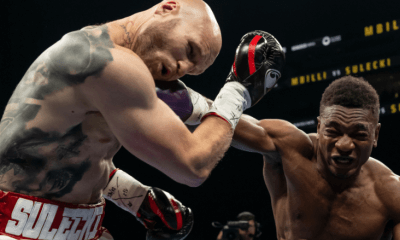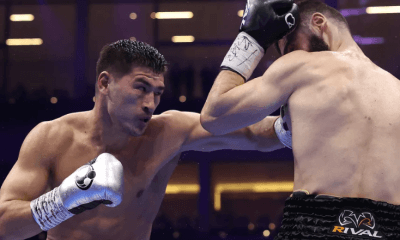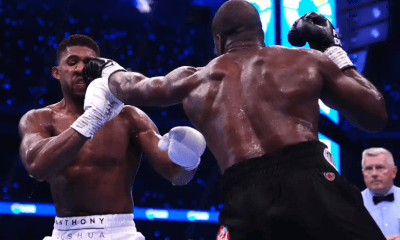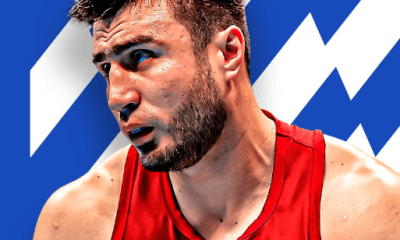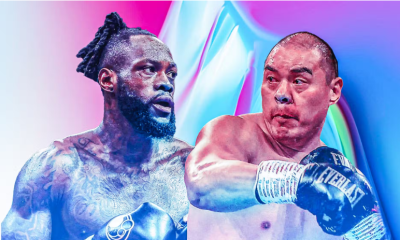Asia & Oceania
Deontay Wilder: To Russia With Gloves (or Maybe Not)
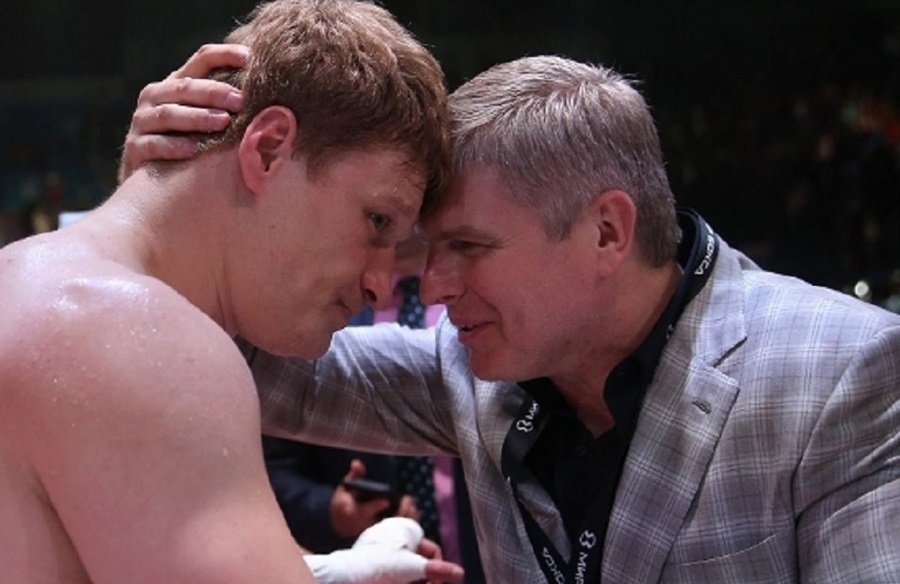
Deontay Wilder – The question was not unexpected, given the perceived parallels between reel-life, as presented by Hollywood, and real-life. During WBC heavyweight champion Deontay Wilder’s teleconference with the American boxing media on Wednesday, 10 days prior to his May 21 title defense against Russia’s Alexander Povetkin in Moscow, he was asked if he had been watching, “to pump yourself up,” the montage of Sylvester Stallone, as fictional heavyweight champion Rocky Balboa, training old-school style in an isolated, snow-blanketed patch of the Soviet Union for his impending bout with towering Russian slugger Ivan Drago in Moscow.
“Pumping yourself up” became more of a hot-button issue when Povetkin tested positive for meldonium, an endurance-enhancing drug that this year was included by the World Anti-Doping Agency (WADA) on the list of banned substances. The sample was collected on April 27.
“We’re certainly saddened and disappointed, but not shocked,” said Wilder’s promoter, Lou DiBella, who has been aware for some time of allegations that Russian authorities are at best lax when it comes to monitoring that country’s athletes for performance-enhancing drugs. “We’re discussing our options right now.”
If a second test for Povetkin comes back positive, the fight will be canceled or, at the least, postponed. However, a negative result might still allow for the fight, which has historic ramifications, to go on as scheduled.
Before the bombshell about Povetkin’s positive drug test went public, Wilder had been upbeat about his Russian adventure and its joked about its point of reference to a Rocky movie.
“`Rocky’ was a classic, I, II, III and IV,” Wilder said from his for-now training site in Sheffield, England, chuckling at the simplistic analogy between what he will attempt to do in the Khodynka Ice Palace and what Stallone’s Philadelphia-bred “Italian Stallion” did in the rousing climax to 1985’s Rocky IV. “We definitely know how the movie goes. It’s exciting to be able to go to Russia and re-live the moment. But this is real time, a true story.”
Still, Wilder allowed, “I’m the black Rocky, baby,” again with a trace of resigned amusement in his voice.
Actually, references to a movie are quite appropriate in discussing the curious lead-up to the pairing of Wilder (36-0, 35 KOs), the 6-foot-7 knockout machine from Tuscaloosa, Ala., and Povetkin (30-1, 22 KOs), who at 6-2 is a closer physical match to Rocky Balboa than to the hulking Drago. But whatever links there are between this fight, the first in which a U.S. champion defends his title in Russia, and Rocky IV seem less noteworthy than those to 2015’s based-on-a-true-story Bridge of Spies, given all the out-of-the-ring intrigue. Could any scriptwriter seeking to tell the tale of Wilder-Povetkin plausibly concoct a story line involving competing Russian billionaires and plot twists that might include Cold War-style skullduggery, up to and including suspicions of PED use by Povetkin and the possibility of the champion’s food and water being tampered with?
Before the meldonium melodrama arose, DiBella, who, who has promoted all three of Wilder’s title defenses since he dethroned Bermane Stiverne on Jan. 17, 2015, said, “We’re making sure everything is being taken care of in Moscow. We’re prepared for whatever is put in front of us. I know Deontay’s prepared for whatever’s in front of him in the ring.”
There already had been legitimate concerns regarding the fight. To date there has been no agreement for Showtime, which holds the exclusive U.S. rights to televise Wilder’s bouts, from Russia-based World of Boxing to even beam the fight back to America. In fact, there hadn’t even been any contact between Russian billionaire Andrey Ryabinski and DiBella since Ryabinski won the WBC-ordered purse bid on Feb. 26. The situation was like high-stakes poker with Ryabinski, DiBella and Showtime sitting at a green-felt-covered table, and Ryabinski seemingly holding all the cards.
“We are working to finalize a deal with World of Boxing to televise this important fight,” said Chris DeBlasio, vice president of Communications for Showtime Sports, in deliberately vague terms. “I can’t go into any specifics about ongoing negotiations, but suffice to say that Showtime is committed to delivering the most important fights in the heavyweight division. We’ve televised Deontay’s world title fights over the past two years; we’re hoping that doesn’t change for this event, of course.”
Added DiBella: “We’re confident that this is going to get done. I’m not going to tell you that communication is what we’re used to in a fight of this magnitude, but I am confident that when we get to Moscow Mr. Ryabinski and his company will be welcoming and we’re not going to face any adversity there. We’re hoping that when we’re there communication will be a little more open than it’s been so far.”
The prevailing belief in February, at least in the U.S., had been that DiBella’s company, DiBella Entertainment, would win the purse bid with he believed would be a large enough number to top any would-be competitor. Although the first two of Wilder’s WBC defenses had been in Birmingham, Ala., the most recent – a ninth-round knockout of Poland’s Artur Szpilka on Jan. 16 – was held at the Barclays Center, in Brooklyn, N.Y., before a loud and raucous paid attendance of 12,668, many of whom were Eastern Europeans living in the area. And as badly as DiBella wanted a return to Brooklyn for Wilder-Povetkin, so did Mikhail Prokhorov – let’s call him Russian billionaire No. 1 – who owns the NBA’s Brooklyn Nets and is principal owner of the not-quite-four-year-old Barclays Center. Prokhorov was prepared to back DiBella’s play all the way.
But even though DiBella submitted a bid of $5.1 million, which under normal circumstances would have been more than enough to secure the fight, Ryabinski – hereafter to be designated as Russian billionaire No. 2 – went even further above market value with a winning bid of $7.125 million.
For a brief time, there was some hope all parties might agree to stage the fight at Barclays anyway, given the huge drawing power of such Eastern European favorites as Gennady Golovkin and Sergey Kovalev in metropolitan New York. Even Wilder, who was wrapped in the warm embrace of his home-state Alabama fans in stoppage victories over Eric Molina, a Texan, and France’s Johann Duhaupas, heard his share of boos when he threw down with Szpilka. There are plenty of people of Polish extraction in and around New York City, and Wilder, his U.S. citizenship and bronze medal at the 2008 Beijing Olympics notwithstanding, hence his nickname of the “Bronze Bomber,” could have expected a similarly harsh reaction against Povetkin from all the transplanted Russians coming in from Brighton Beach and other nearby points.
Ryabinski, however, was determined to bring the fight to Mother Russia and what he wants, he tends to get. This is the deep-pocketed individual who so wanted to promote Povetkin against IBF/WBO/WBA/IBO champion Wladimir Klitschko that he entered a prohibitively huge $23.23 million purse bid, blowing away those submitted by K2 Promotions ($7.13 million) and Sauerland Event ($6.01 million). Thus was Klitschko-Povetkin held on Oct. 5, 2013, in Moscow’s Olimpiyskiv Arena, the one and only time among “Dr. Steelhammer’s” 27 world title fights over two reigns in which he defended his belts in Russia. That might come as a surprise to some people, given the fact that Wladimir’s father was a colonel in the Soviet army, but Wlad and older brother Vitali are Ukrainians who were never particularly fond of Russia, and even less so given the Russian intervention into Ukraine that began in 2014 and continues to this day. Vitali – now the mayor of Kiev, Ukraine – also had only one title bout in Russia, scoring a fourth-round stoppage of Lebanon-born, Germany-based Manuel Charr on Sept. 18, 2012, his final fight before going into politics.
So it was back to the Moscow well again for Povetkin, who failed to reward Ryabinsky, his billionaire benefactor, when he was floored four times against Klitschko en route to a lopsided decision loss. There is some shared history between the principals, in a manner of speaking, with Povetkin, as the super heavyweight gold medalist at the 2004 Athens Games, sharing an Olympic pedigree with Wilder. But an American fighting in Russia isn’t quite the oddity it was in Rocky IV; the first U.S. boxer to have done so was Calvin Grove, the former IBF featherweight champ from Coatesville, Pa., who scored a 12-round unanimous decision over another U.S. import, Anthony English, to win – get this – the United States Boxing Association super featherweight belt on Aug. 20, 1989, in Moscow’s Dynamo Basket Hall.
Should Povetkin – provided he is even be allowed to fight — erase the memory of his thudding performance against Wladimir Klitschko by dethroning the slightly favored (as of this moment, by 8-5) Wilder, it won’t be a first; 7-foot, 320-pound Russian plodder Nikolay Valuev was the first fighter from his country to hold a heavyweight title, twice reigning as WBA champ. Even Valuev, however, was reluctant to defend his belt in his homeland; of his seven world championship bouts, four were held in Germany, two in Switzerland, one in Rosemont, Ill.
What is unique about Wilder-Povetkin is its return to Cold War, Bridge of Spies-type accoutrements, but adapted to 21st century economic and political realities. In other words, this is not the world as once viewed through the ideological prism of U.S. capitalism vs. Soviet communism.
For one thing, the current leader of Russia is Vladimir Putin, a former KGB operative who, despite building the Russian military back up to near-Cold War levels, seems contentedly disinclined to adhere to the policies of Joseph Stalin, Nikita Khruschev and Leonid Brezhnev. It was Putin who made it his personal mission to see that the 2014 Winter Olympics were awarded to Sochi, a Russian resort town on the shores of the Black Sea, and whose staging cost a staggering $50 billion, far and away the most expensive Olympiad ever. Putin also stated, in 1999, that communism was “a blind alley, far away from the mainstream of civilization.”
Meanwhile, back in America, “Democratic Socialist” Presidential candidate Bernie Sanders, the Senator from Vermont who honeymooned in Russia, is campaigning on a worker’s-paradise platform that played so well in 1917 Russia with the overthrow of the czar. On the Republican side, likely nominee Donald Trump’s blustery approach looks and sounds a lot like … Vladimir Putin’s, with a nod toward Jerry Springer.
All of which makes Wilder-Povetkin, in concept if not necessarily in reality, more emblematic of the times in which we live now rather than those in which big crowds (a franchise record $300 million gross) flocked to neighborhood multiplexes 31 years ago for Rocky IV. But it was easier then to tell the good guys from the bad guys, or at least those cast in the roles partisans on both sides of the us-vs.-them divide were preconditioned to accept.
It’s enough to give traditional boxing fans, those who like their sports action uncluttered with layers of non-boxing considerations, a headache. Here’s hoping that the fight comes off and that it delivers all the good stuff that has been hinted at inside the ropes, and nowhere else.
-

 Featured Articles3 weeks ago
Featured Articles3 weeks agoVito Mielnicki Jr Whitewashes Kamil Gardzielik Before the Home Folks in Newark
-

 Featured Articles2 days ago
Featured Articles2 days agoResults and Recaps from New York Where Taylor Edged Serrano Once Again
-

 Featured Articles6 days ago
Featured Articles6 days agoFrom a Sympathetic Figure to a Pariah: The Travails of Julio Cesar Chavez Jr
-

 Featured Articles4 weeks ago
Featured Articles4 weeks agoCatching Up with Clay Moyle Who Talks About His Massive Collection of Boxing Books
-

 Featured Articles1 week ago
Featured Articles1 week agoCatterall vs Eubank Ends Prematurely; Catterall Wins a Technical Decision
-

 Featured Articles3 weeks ago
Featured Articles3 weeks agoMore Medals for Hawaii’s Patricio Family at the USA Boxing Summer Festival
-

 Featured Articles4 weeks ago
Featured Articles4 weeks agoRichardson Hitchins Batters and Stops George Kambosos at Madison Square Garden
-

 Featured Articles22 hours ago
Featured Articles22 hours agoResults and Recaps from NYC where Hamzah Sheeraz was Spectacular

